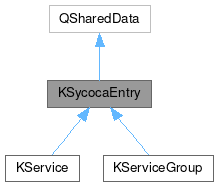KSycocaEntry
#include <ksycocaentry.h>

Public Types | |
| typedef QList< Ptr > | List |
| typedef QExplicitlySharedDataPointer< KSycocaEntry > | Ptr |
Public Member Functions | |
| QString | entryPath () const |
| bool | isDeleted () const |
| bool | isSeparator () const |
| bool | isType (KSycocaType t) const |
| bool | isValid () const |
| QString | name () const |
| void | setDeleted (bool deleted) |
| QString | storageId () const |
| KSycocaType | sycocaType () const |
 Public Member Functions inherited from QSharedData Public Member Functions inherited from QSharedData | |
| QSharedData (const QSharedData &) | |
Protected Member Functions | |
| KSERVICE_NO_EXPORT | KSycocaEntry (KSycocaEntryPrivate &d) |
Protected Attributes | |
| std::unique_ptr< KSycocaEntryPrivate > const | d_ptr |
Related Symbols | |
(Note that these are not member symbols.) | |
| enum | KSycocaType |
Detailed Description
Base class for all Sycoca entries.
You can't create an instance of KSycocaEntry, but it provides the common functionality for servicetypes and services.
Definition at line 32 of file ksycocaentry.h.
Member Typedef Documentation
◆ List
| typedef QList<Ptr> KSycocaEntry::List |
A list of shared data pointers for KSycocaEntry.
Definition at line 58 of file ksycocaentry.h.
◆ Ptr
A shared data pointer for KSycocaEntry.
Definition at line 54 of file ksycocaentry.h.
Constructor & Destructor Documentation
◆ KSycocaEntry() [1/2]
| KSycocaEntry::KSycocaEntry | ( | ) |
Definition at line 20 of file ksycocaentry.cpp.
◆ KSycocaEntry() [2/2]
|
explicitprotected |
Definition at line 25 of file ksycocaentry.cpp.
Member Function Documentation
◆ entryPath()
| QString KSycocaEntry::entryPath | ( | ) | const |
- Returns
- the path of this entry The path can be absolute or relative. The corresponding factory should know relative to what.
Definition at line 42 of file ksycocaentry.cpp.
◆ isDeleted()
| bool KSycocaEntry::isDeleted | ( | ) | const |
- Returns
- true if deleted
Definition at line 54 of file ksycocaentry.cpp.
◆ isSeparator()
| bool KSycocaEntry::isSeparator | ( | ) | const |
- Returns
- true, if this is a separator
Definition at line 66 of file ksycocaentry.cpp.
◆ isType()
| bool KSycocaEntry::isType | ( | KSycocaType | t | ) | const |
Returns true if this sycoca entry is of the given type.
Definition at line 32 of file ksycocaentry.cpp.
◆ isValid()
| bool KSycocaEntry::isValid | ( | ) | const |
- Returns
- true if valid
Definition at line 83 of file ksycocaentry.cpp.
◆ name()
| QString KSycocaEntry::name | ( | ) | const |
- Returns
- the name of this entry
Definition at line 89 of file ksycocaentry.cpp.
◆ setDeleted()
| void KSycocaEntry::setDeleted | ( | bool | deleted | ) |
Sets whether or not this service is deleted.
Definition at line 60 of file ksycocaentry.cpp.
◆ storageId()
| QString KSycocaEntry::storageId | ( | ) | const |
- Returns
- the unique ID for this entry In practice, this is storageId() for KService and name() for everything else.
- Since
- 4.2.1
Definition at line 48 of file ksycocaentry.cpp.
◆ sycocaType()
| KSycocaType KSycocaEntry::sycocaType | ( | ) | const |
internal
Definition at line 37 of file ksycocaentry.cpp.
Friends And Related Symbol Documentation
◆ KSycocaType
|
A KSycocaType is a code (out of the KSycocaType enum) assigned to each class type derived from KSycocaEntry .
To use it, call the macro K_SYCOCATYPE( your_typecode, parent_class ) at the top of your class definition.
Definition at line 19 of file ksycocatype.h.
Member Data Documentation
◆ d_ptr
|
protected |
Definition at line 101 of file ksycocaentry.h.
The documentation for this class was generated from the following files:
Documentation copyright © 1996-2025 The KDE developers.
Generated on Fri May 2 2025 11:57:42 by doxygen 1.13.2 written by Dimitri van Heesch, © 1997-2006
KDE's Doxygen guidelines are available online.